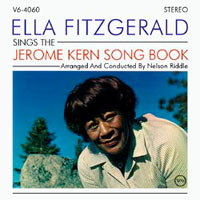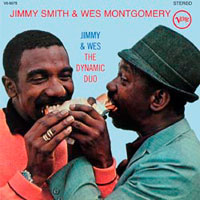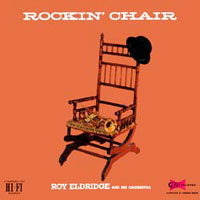![[SoundStage!]](../sslogo3.gif) The Vinyl Word The Vinyl WordBack Issue Article |
May 2007 Found on Vinyl: Ella Fitzgerald, Jimmy Smith & Wes Montgomery, and Roy Eldridge Jazz is different things to different people. To some, jazz is Louis Armstrong and New Orleans. To others it’s Duke Ellington and the big-band era. Still others consider Miles, Monk and Mingus the holy trinity of jazz. While yet another group hails Ornette Coleman and free jazz as the one true path. But, as Fats Waller famously told a little old lady who once asked him to describe jazz to her, "Honey, if you don’t know by now, don’t touch it." Listen to any of the three albums whose descriptions follow and you’ll get a better handle on what old Fats was referring to. All are as different as can be, yet all satisfy -- all are jazz. Ella Fitzgerald needs no introduction. If you’ve not heard a a few songs she’s sung by now, then I’d suggest you give up audio as a hobby and take up stamp collecting. Ella is probably the best-known jazz singer of all time. There is, almost literally, no song that she couldn’t sing. She’s been backed by a veritable who’s-who of jazz musicians -- from the Oscar Peterson Trio to full-blown orchestration conducted by likes of Nelson Riddle, and all points in between. In each context it was Ella’s fabulous voice and way of using it that was the star of the proceedings. Among Ella’s best-loved collections are her Songbook series. In these she interpreted and defined the songs of Gershwin, Berlin, Rogers & Hart, Porter, and Jerome Kern.
When I say that Ella "defined" songs, I mean that the songs all sound like they were written just for her, so great are her interpretations. She has become the measuring stick by which all jazz singers are judged. Ella had that innate ability to get inside whatever the number she was singing. She understood, as few others have, what the songwriter had in mind. Here, Ella gives these chestnuts that same treatment. Backed as she often was on this series on Verve by the Nelson Riddle Orchestra, this is melt-you-in-your-listening-chair music. You will not want to hear it end.
You get only five selections here to sample, but each has its own beauty. Side one’s two numbers are more up tempo. Smith is dancing on his keyboard, and Montgomery makes his guitar sing. The other side is more laid-back, if only because on two of the three numbers Smith and Montgomery are backed only by Barretto on percussion and Tate on drums. These two songs leave plenty of space for the organ and guitar to strut their stuff. This is a good album that, while not overshadowing Smith’s Blue Note recordings or Montgomery’s Riverside output, still stands high in terms of recordings by these two musicians.
Thus, it’s no surprise that Rockin’ Chair [Speakers Corner/Clef MG C-704], which was originally recorded on Granz’s Clef label, is a fine demonstration of Eldridge’s abilities. Just take a listen to any of the tracks and then listen to any of the trumpet players that came after and hear the influence Eldridge had on them -- especially his good friend Dizzy Gillespie. Eldridge could reach for and get notes that most mere mortals could only dream of. Not only could he reach them, he could do so with both power and precision. Forceful is not a strong enough word to describe this quality. One listen and you can hear that Granz was right: Eldridge really did put his all into every song he played. The sense of fun on this album is clearly evident. (Eldridge is reputed to have had a wicked sense of humor.) From the very start you can tell that Eldridge and his band were having a great time, and they slipped right into the groove. Rockin' Chair is full to overflowing with the kind of jazz that came between the swing bands that Eldridge grew up playing in and the bebop revolution ushered in half a decade earlier by Charlie Parker and Gillespie. Eldridge was, like Coleman Hawkins, a musician who never stopped assimilating styles and using them to advance his art. I’ve saved the sonic information on all these albums until the end because of their uniformly excellent sound. This should come as no real surprise as all three of these titles come from the vaults of Verve through the good care of Speakers Corner, which has been in the vinyl-reissue business for almost as long as there has been a vinyl-reissue business. The company's catalog rivals that of the big boys on the reissue block -- Classic Records -- in both quantity and quality. On this stereo release, Ella's voice is superbly clean and clear -- the true star of the proceedings. Riddle’s orchestra is well rendered too, but they are kept in the background where they belong. After all, this is an Ella Fitzgerald album, and the reissue's whisper-quiet surfaces and flat pressing make for an LP to treasure. The Jimmy Smith/Wes Montgomery album continues in the same vein. It, too, is stereo, so the soundstage, like that of the Fitzgerald LP, is wide and deep. I love the sound of a Hammond organ, especially when it’s as clearly rendered as it is here. Engineer Val Valentine captured the organ sound almost perfectly. Montgomery’s guitar is also allowed to bloom. Once again, Speakers Corner delivers a flat, quiet pressing that allows one to relax and slip into the same groove as the musicians. The Roy Eldridge LP is a different kettle of fish entirely. Well, almost entirely. The only thing it has in common with the other two records is that it also sounds wonderful. But Rockin’ Chair is a mono LP, so there is little in the way of soundstaging to discuss. Oh, all the instruments are precisely rendered, so you can follow them at will. Eldridge’s trumpet is all brass and power -- he was no shrinking violet -- and you can hear all that power and each of those high notes rendered with clarity and precision. It’s even fun to listen to him sing (or scat) as he does a couple of times. Eldridge plays with an unnamed four-string orchestra on side one, and with Oscar Peterson on piano and organ, Ray Brown on bass, Barney Kessel on guitar, and Buddy Tate on tenor sax on side two. For a recording from the early 1950s, the sound is wonderfully clean and clear. You won’t for a minute feel cheated that this is mono and not stereo. Back to our original question -- what is jazz? Simple. It’s here for you on these three albums. Speakers Corner has done very, very well by this music and jazz itself. ...John Crossett |
|
![[SoundStage!]](../sslogo3.gif) All Contents All ContentsCopyright © 2007 SoundStage! All Rights Reserved |
 While I may not describe Sings
The Jerome Kern Songbook [Speakers Corner/Verve V6-4060] as pure jazz, it is pure Ella
Fitzgerald. She couldn't help but bring a modicum of her ethic to any recording, and this
one was no exception. While she mostly plays it straight with these classic songs, she
uses her voice in a manner that suggests her jazz roots on more than one occasion.
While I may not describe Sings
The Jerome Kern Songbook [Speakers Corner/Verve V6-4060] as pure jazz, it is pure Ella
Fitzgerald. She couldn't help but bring a modicum of her ethic to any recording, and this
one was no exception. While she mostly plays it straight with these classic songs, she
uses her voice in a manner that suggests her jazz roots on more than one occasion. Next slip The Dynamic
Duo – Jimmy Smith and Wes Montgomery [Speakers Corner/Verve V6-8678] onto your
turntable. Recorded by Creed Taylor for Verve and arranged by Oliver Nelson this album has
all the earmarks of sonic bliss. Right from the beginning you’ll know that this is
going to be a good one. While Taylor’s output was spotty at best during his tenure at
Verve, this was one of his better efforts. Both Smith on his Hammond organ and Montgomery
on guitar were in prime form on this date. Nelson’s arrangements for his orchestra --
which included the likes of Phil Woods, Clark Terry, Jimmy Cleveland, Ray Barretto, and
Grady Tate -- were ever tasteful and made sure that the two stars shone the brightest.
Nelson was a master at arranging this type of date, and he didn’t disappoint here.
While always noticeable, the backup band never overshadows or competes with Smith and
Montgomery.
Next slip The Dynamic
Duo – Jimmy Smith and Wes Montgomery [Speakers Corner/Verve V6-8678] onto your
turntable. Recorded by Creed Taylor for Verve and arranged by Oliver Nelson this album has
all the earmarks of sonic bliss. Right from the beginning you’ll know that this is
going to be a good one. While Taylor’s output was spotty at best during his tenure at
Verve, this was one of his better efforts. Both Smith on his Hammond organ and Montgomery
on guitar were in prime form on this date. Nelson’s arrangements for his orchestra --
which included the likes of Phil Woods, Clark Terry, Jimmy Cleveland, Ray Barretto, and
Grady Tate -- were ever tasteful and made sure that the two stars shone the brightest.
Nelson was a master at arranging this type of date, and he didn’t disappoint here.
While always noticeable, the backup band never overshadows or competes with Smith and
Montgomery. Norman Granz was
once asked which musician he felt best exemplified jazz. He didn’t take long to come
up with an answer -- Roy Eldridge. Granz claimed that Eldridge never took a moment off. He
was always on, always trying to give all of his ability to any performance he was a part
of. That quality, Granz noted, was what jazz was all about.
Norman Granz was
once asked which musician he felt best exemplified jazz. He didn’t take long to come
up with an answer -- Roy Eldridge. Granz claimed that Eldridge never took a moment off. He
was always on, always trying to give all of his ability to any performance he was a part
of. That quality, Granz noted, was what jazz was all about.